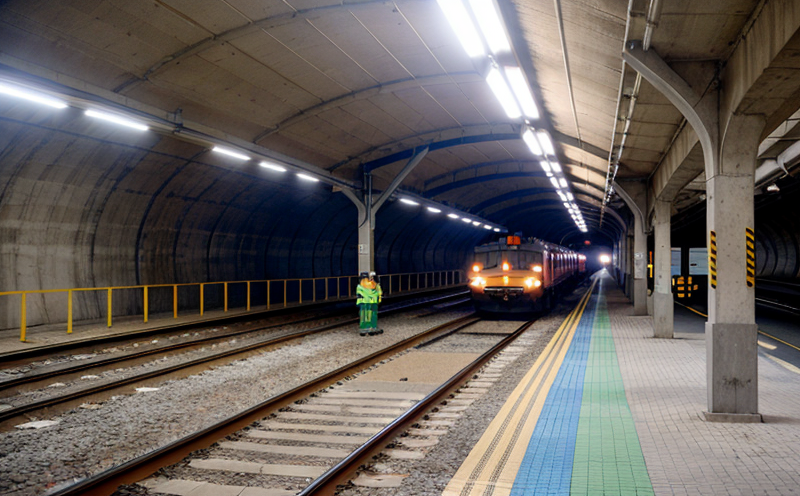EN 1999 Load Testing of Aluminum Bridge Components
The European Standard EN 1999 is a comprehensive framework designed to ensure the structural integrity and safety of bridge components. This standard specifies detailed procedures for load testing, which are essential in validating the design against real-world conditions. When dealing with aluminum bridge components, the unique properties of these materials—such as high strength-to-weight ratio and corrosion resistance—require specialized testing methodologies.
Aluminum bridges often face a variety of environmental stresses including temperature fluctuations, exposure to saltwater, and dynamic loading from traffic. The EN 1999 standard addresses these challenges by providing stringent requirements for load testing that simulate the expected operational environment. This ensures that the aluminum components meet not only static but also dynamic load requirements.
The process begins with careful selection of test specimens representative of the actual bridge elements. These are typically fabricated using the same materials and processes as those used in construction to ensure accuracy in testing outcomes. Once selected, these specimens undergo detailed pre-test inspections to confirm their structural integrity before any loading is applied.
Load testing itself involves applying controlled loads to the specimen while monitoring critical parameters such as strain, deflection, stress concentrations, and fracture behavior using advanced sensors and instrumentation. The testing setup must be capable of accurately replicating real-world loading scenarios, including sudden impacts or gradual fatigue failures that can occur over time.
After the load application phase, thorough analysis is conducted to determine whether the specimen meets all specified criteria outlined in EN 1999. Acceptance criteria include not only structural integrity but also durability and resistance to environmental factors. Compliance with these stringent standards ensures that aluminum bridge components perform reliably under expected conditions.
Our laboratory employs state-of-the-art equipment and experienced technicians who are well-versed in adhering to the requirements of EN 1999. We utilize sophisticated software for data collection, processing, and interpretation, ensuring precise measurements and reliable results. Our comprehensive approach includes not only rigorous testing but also detailed reporting that provides actionable insights for continuous improvement.
The importance of load testing cannot be overstated, especially when dealing with materials like aluminum which have unique properties compared to traditional steel structures. By adhering strictly to the requirements set forth in EN 1999, we ensure that every component meets the highest standards of safety and reliability, thereby enhancing public confidence and trust.
Our commitment extends beyond mere compliance; it encompasses proactive measures aimed at preventing potential issues before they arise. Through regular inspections and advanced analytics, we identify areas for improvement early on, allowing for preemptive adjustments in design or manufacturing processes. This forward-thinking approach not only enhances the longevity of structures but also contributes significantly to overall safety standards.
In conclusion, EN 1999 load testing is a critical component in ensuring the structural integrity and durability of aluminum bridge components. By meticulously following this standard, we provide assurance that these vital infrastructure elements will perform reliably under challenging conditions, safeguarding both public safety and investment.
- Environmental Factors: Consideration of temperature changes, saltwater exposure, and dynamic loads from traffic.
- Material Properties: High strength-to-weight ratio and resistance to corrosion for aluminum components.
- Testing Criteria: Compliance with EN 1999 standards ensuring structural integrity, durability, and resistance to environmental factors.
EuroLab stands out in the realm of railway and transportation testing by offering unparalleled expertise and cutting-edge technology. Our commitment to excellence is reflected in our state-of-the-art facilities equipped with top-tier instrumentation tailored specifically for EN 1999 compliance.
Our highly skilled team comprises industry leaders who possess extensive experience in aluminum bridge component testing, ensuring accurate and reliable results every time. This deep-rooted knowledge allows us to provide customized solutions that cater precisely to your specific needs, whether it's for research and development or quality assurance purposes.
We pride ourselves on delivering timely service without compromising on quality. Our streamlined processes allow us to handle multiple projects simultaneously while maintaining the highest levels of accuracy and precision. This efficiency translates directly into cost savings for our clients by minimizing downtime and reducing overall project timelines.
Moreover, EuroLab's dedication to sustainability is evident in our commitment to using eco-friendly practices throughout all stages of testing. From energy-efficient equipment to waste management protocols, every aspect contributes towards creating a more sustainable future without sacrificing performance standards.
The combination of advanced technology, experienced personnel, and unwavering quality assurance makes EuroLab the go-to choice for any organization seeking reliable EN 1999 load testing services. Trust us to deliver results that meet or exceed expectations consistently.





